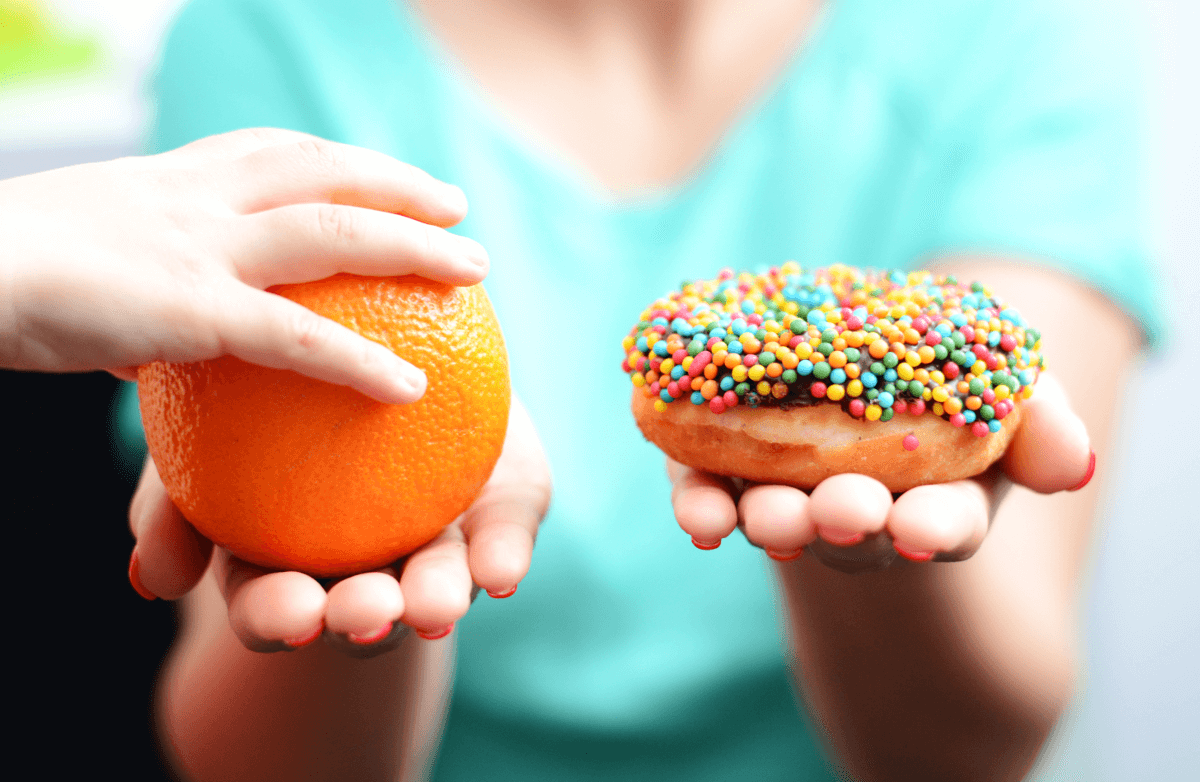Whether it's an unintentional sugar binge, a string of skipped workouts or unrealistic goals, take comfort in knowing that bumps and obstacles are par for the course. The key is finding the right detours and creative solutions. Don't let any of these all-too-common blunders derail your weight-loss goals.
1. Forcing yourself to eat foods you hate.
The main reason that most diets fail is because they're not sustainable. Trying to choke down foods you can't stand just because they're on a prescribed meal plan won't keep you on track for the long term. According to Susan Bowerman, MS, RD, the director of nutrition education for Herbalife, this strategy turns dieting into a form of punishment, a tactic that rarely works. "If you punish yourself by eating something you can’t stand, it’s easy to rationalize a reward in the form of a high-calorie treat, which will only undermine your efforts," she warns.
If you do force yourself to eat a certain healthy food, you could end up hating all foods in that group by association. For instance, if you dislike kale but keep adding it to your meals, you might get turned off by all leafy greens. Instead, look for alternatives that are more palatable to you. "There’s nothing magical about kale," says Bowerman. "Baby spinach, Swiss chard or arugula are just as good for you, and you might like those better." As you learn which foods help you achieve your goals while also pleasing your palate, you'll develop lifelong healthy habits.
2. Weighing yourself too often.
When you embark on a weight-loss journey, it might seem counterintuitive to avoid looking at the scale—but weight fluctuates day to day for a variety of reasons, including water retention or hormonal fluctuations. Trainer and founder of Fit Armadillo Catherine Basu has often seen clients who gain weight one day, become discouraged and want to give up. "To avoid getting discouraged by the numbers on the scale, it's best to weigh yourself once a week at the same time—or maybe not at all," she suggests. "Instead, take circumference measurements, particularly at your hips and waist. These are a much better indicator of your overall health and success."
Instead of getting caught up in the numbers, Jessica May Tang, corporate wellness coach and founder of Damon Wellness Consulting, recommends focusing on finding your "meaningful why." Remind yourself of the reasons you started down the path to weight loss in the first place; chances are they have more to do with quality of life and less to do with hitting some arbitrary weight. Remember, having more energy to keep up with your active children or tend to your garden is more meaningful than any number.
3. Testing the waters.
After a week or two of sticking to a weight-loss plan, you may get frisky and be tempted to start indulging in your old food vices. When you're bolstered by your newfound confidence, the bad eating behaviors that you’ve suspended while on the diet may seem more manageable, but fitness coach and sports nutritionist Brandon Mentore warns that this is a set-up for mental punishment.
"You want to eat the cookie because you want to prove that it doesn’t control you, but what usually ends up happening is that you'll experience guilt after you eat it, and then pull the reins tighter on your diet and exercise," he says. "Instead, stick to your plan and splurge only when you’re supposed to."
4. Trying to eat "perfectly."
It's great to have discipline and motivation, but slipping into the all-or-nothing mentality can wreak havoc on your long-term journey. Chelsey Amer, registered dietitian and creator of C it Nutritionally, advises her clients to steer clear of overly rigid diets, such as only eating grilled chicken and steamed broccoli or allowing zero indulgences. "These types of extreme changes can lead to burnout instead of a long-term healthy lifestyle," she warns.
Ken Immer, president of Culinary Health Solutions, encourages dieters to make a list of which foods are their "non-negotiables," or the ones they love most and can't imagine giving up. "If you don’t realize which foods are your non-negotiables and then they go missing, it can create extra anxiety," he says. "When those foods can be included, even in small amounts, the entire diet experience can be more enjoyable, and therefore more successful."
5. Skimping on sleep.
Before you pat yourself on the back for prepping meals into the wee hours of the night or waking before dawn for a drowsy workout, know that your scant sleep could be sabotaging your weight-loss goals. According to Dr. Caroline Apovian, director of the Nutrition and Weight Management Center at the Boston Medical Center, adults who sleep less than seven hours per night are 30 to 80 percent more likely to develop cardiovascular disease, hypertension and type 2 diabetes as those who sleep eight hours or more.
"Research has shown that lack of sleep may be a potential contributor to weight gain and the growing obesity epidemic, as it causes disruptions to a number of hormonal and metabolic processes," says Jessica Matthews, senior advisor for health and fitness education for the American Council on Exercise. A research study conducted at the University of Chicago found that partial sleep deprivation can lead to increased appetite, as the circulating levels of hormones that regulate hunger are altered by decreases in shuteye. To keep your weight-loss efforts on track and to support your overall health and well-being, Matthews recommends devoting at least a solid seven to eight hours per night to good, quality sleep.
6. Accepting imposters.
By removing sugar, fat or gluten from their products, food manufacturers want you to believe you can have the best of both worlds: all the tastes you love with none of the guilt. "The problem is that those ingredients are almost always replaced with ingredients that are as bad as or worse than the originals," warns Dr. Candice Seti, nutrition coach with The Weight Loss Therapist. For example, fat is often replaced by excess sugar, sugars are replaced with artificial ingredients and gluten is replaced with refined carbohydrates.
Instead, Dr. Seti recommends choosing options that are naturally free from ingredients you wish to avoid. For example, try naturally gluten-free quinoa instead of gluten-filled pasta for a nutrient-rich alternative.
7. Eating (or drinking) too much fruit.
Although fruit is a healthy alternative to cakes, cookies and packaged snacks, you'll have a hard time shedding pounds if you're consuming several servings per day. "Although it's natural, fruit is almost pure sugar—and if you're not working very hard, lots of that sugar will get stored as fat," warns Alex Haschen, personal trainer and child fitness advocate with Boost. Haschen also warns against switching from soda to fruit juice. "Juice is 100 percent sugar," he says. "There’s no fiber or water to slow digestion, and it has about the same caloric content as a glass of soda. When in doubt, reach for water instead.
8. Overestimating the power of exercise.
Exercise is a key element of optimal fitness—contributing to better heart health, higher energy levels and improved moods—but Dr. Seti says you shouldn't assume that your killer workout gives you a free pass to eat whatever you want. "Even rigorous exercise only requires a slight bump in [your daily caloric intake], and those calories still need to come from nutritious foods that will fuel your body to rebuild and recover," she says.
Another common mistake is focusing only on cardiovascular workouts. Although cardio burns calories and improves heart health, lung capacity and energy levels, it shouldn't be your only form of exercise. "Relying on cardio exercise alone not only burns fat, but also burns muscle," warns Dr. Apovian. "Losing muscle mass contributes to a slower, compromised metabolism and a softer, rounder shape. To lose weight and keep it off, it's important to include strength training to maintain and build muscle mass."
9. Not giving the brain time to adjust.
It's easy to get caught up in the physical aspect of weight loss, but how's your mental game? According to health expert Terra Wellington, the brain needs time to "rewire" itself to adjust to a new diet. "Most people don’t realize that their mind will fight them on a food change, because it most likely won't be satisfying to the brain at first," she says. For example, if your brain is accustomed to certain tastes, such as a lot of salt, fatty foods, high-fructose corn syrup or other sugars, it will take time to mentally adjust to more plant-based foods. "The solution is to be more gradual with the change so that the brain doesn’t fight you so much," says Wellington. "Over time, the new diet will become more normal and less difficult for the brain to accept."
10. Ignoring portion sizes.
It may be tempting to fill your entire plate with health-boosting superfoods, but portion sizes still matter. "Eating reasonable portions is what allows you to fill your diet with the variety you need to get a wide array of nutrients," says Dr. Seti. Also, keep in mind that many nutritious foods—such as almonds, walnuts, avocados, dark chocolate and red wine—are still calorically dense. Even options like berries can add up to an excess of natural sugars if eaten with reckless abandon. While it's great to choose superfoods, remember to always use common sense when it comes to serving sizes.
11. Not listening to your hunger
Our bodies have a built-in ability to regulate food intake, but we often ignore it completely. As humans are conditioned to eat and drink at every social event, there is a tremendous amount of peer pressure that those on a weight-loss journey must overcome. By learning to listen to your hunger cues, though, you can eat exactly what you need and no more.
Next time you're tempted to clean your plate or reach for a snack, Haschen suggests asking yourself if you are truly hungry, or if your appetite is simply a response to the time of day, emotional stress, boredom or seeing someone else eat. If you are truly hungry, eat. If you aren't, don't. When you do eat, stop when you feel satisfied, not stuffed.
"This is the single hardest part about starting a new eating lifestyle," says Haschen. "Realize that hunger is the best determinant of when you should eat, and that experiencing hunger makes eating so much more satisfying."
By being aware of these common beginners weight-loss mistakes, you can make strategic choices to avoid disappointment, frustration or unnecessary temptations. Although no weight-loss journey is free of bumps or plateaus, tailoring your diet and exercise plan to your individual likes, dislikes, needs and goals will keep you moving in the right direction.













